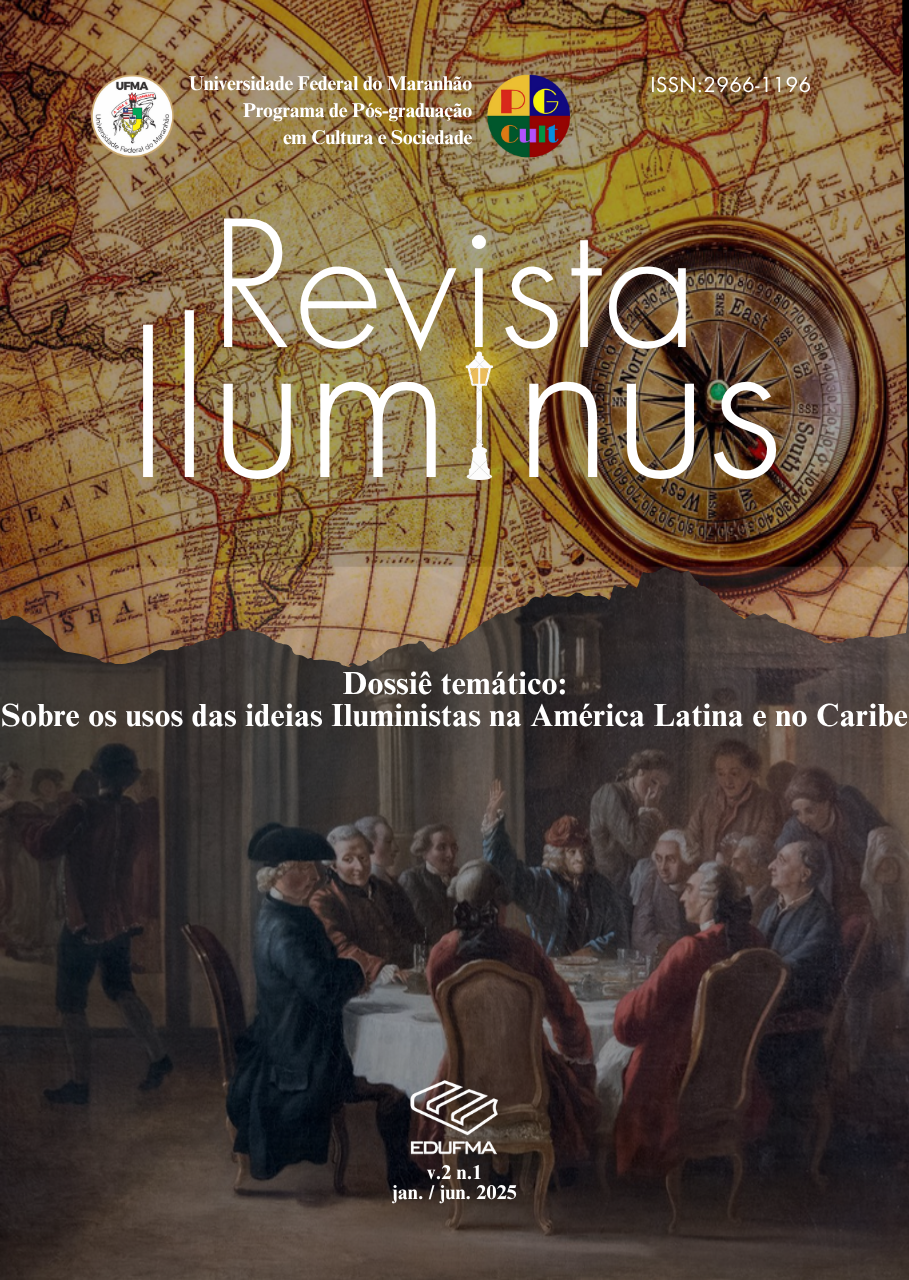Do iluminismo de Flora Tristán: a abolição da propriedade privada, a mulher como ser humano e a educação para os pobres
DOI:
https://doi.org/10.18764/2966-1196.v2n1e26749Palavras-chave:
Pensadores do século XIX, Feminismo do século XIX, Iluminismo latino-americano, Propriedade privada, Mulheres do século XIX, EducaçãoResumo
Por meio de categorias narrativas, este texto reflete sobre as influências do Iluminismo no pensamento de Flora Tristán, uma operária revolucionária franco-peruana da primeira metade do século XIX. É necessário rever as ideias de Rousseau e as críticas que lhe foram feitas por uma das mais importantes mulheres iluminadas ––reconhecidas pelo feminismo–– Mary Wollstonecraft. Por meio de três temas importantes: a abolição da propriedade privada, as mulheres são seres humanos e a educação para os despossuídos. Tristán aborda as propostas dessas duas autoras, para nos situar, ao longo de suas obras, em sua própria perspectiva de mulher despossuída, mestiça (de raízes peruanas) e ativista; com a qual ele constrói um projeto, uma utopia socialmente possível. Tristán afirma os postulados de uma ilustração crítica da modernidade capitalista, a partir da perspectiva das mulheres, dos povos indígenas e dos despossuídos do mundo, juntando-se assim à luta política dos movimentos sociais de seu tempo.
Downloads
Referências
AMORÓS, Cecilia; DE MIGUEL, Ana [Eds.]. Teoría feminista: de la ilustración a la globalización. De la ilustración al segundo sexo, Vol. 1. Madrid: Minerva Ediciones, 2010.
ENGELS, F. El origen de la familia, la propiedad privada y el Estado. Editorial Progreso, 1884.
FEDERICI, Silvia. Calibán y la bruja. Mujeres, cuerpo y acumulación originaria. Traficantes de sueños, 2010.
GARGALLO, Francesca. Flora Tristán. Unión Obrera. Carta a Eléonore Blanc - y Éléonore Blanc Biografía de Flora Tristán. Ediciones desde abajo, 2019.
HERNÁNDEZ, Naomi. La vida y la obra de Flora Tristán en el Perú. Tesis de licenciatura. UNAM, 2020.
HOBSBAWM, E. J. La era de la revolución: 1789–1848 [trad. 1997]. Crítica, 1962.
LLINÀS, Conxa. Flora Tristán, filósofa social. Universidad de Barcelona, 2018.
MARINI, Ruy Mauro. Dialéctica de la dependencia. Buenos Aires: Siglo del Hombre Editores, 1973. [En línea] http://bibliotecavirtual.clacso.org.ar/clacso/se/20100830091927/04dialectica2.pdf
MARX, Karl. El Capital. Siglo XXI, 1867.
DE GOUGES, Olympe. Declaración de los derechos de la mujer y de la ciudadana. 1791. [Versión en línea: Cátedra UNESCO de Derechos Humanos de la UNAM].
ROGERD, Picard. El romanticismo social. Trad. Blanca Chacel. D.F.: Fondo de Cultura Económica, 1986.
ROUSSEAU, Jean Jacques. Émile ou De l'éducation. Trad. José Marchena Ruíz de Cueto. Titivillus. Ed. Digital, 2015.
ROUSSEAU, Jean-Jacques. Discurso sobre el origen de la desigualdad entre los hombres. Trad. y notas de M. Armiño. Madrid: Alianza Editorial, 2012.
ROUSSEAU, J. J. El contrato social. Alianza Editorial, 1762.
SÁNCHEZ, L. Feminismos para la Revolución. Siglo XXI, 2021.
SEGATO, Rita. Contra-pedagogías de la crueldad. Prometeo, 2018.
TENENBAUM, Tamara. Precursoras del feminismo. Clave intelectual, 2020.
TONDA, Concepción. "Fundamentación de la crítica de la economía política en La Sagrada Familia (1845)". Tesis de licenciatura. UNAM, 1981.
TRISTÁN, Flora. La Unión Obrera. Éditions de la Librairie Socialiste, 1843.
TRISTÁN, Flora. Paseos en Londres. Biblioteca Nacional del Perú. Biblioteca digital andina. [s.f.].
TRISTÁN, Flora. Peregrinaciones de una paria. CLACSO, 2020.
WOLLSTONECRAFT, Mary. Vindicación de los derechos de la mujer. Editorial Cátedra, 1792.
Downloads
Publicado
Como Citar
Edição
Seção
Licença
Copyright (c) 2025 Revista Iluminus

Este trabalho está licenciado sob uma licença Creative Commons Attribution 4.0 International License.
A Revista Iluminus está licenciada com uma Licença Creative Commons Atribuição 4.0 Internacional.













